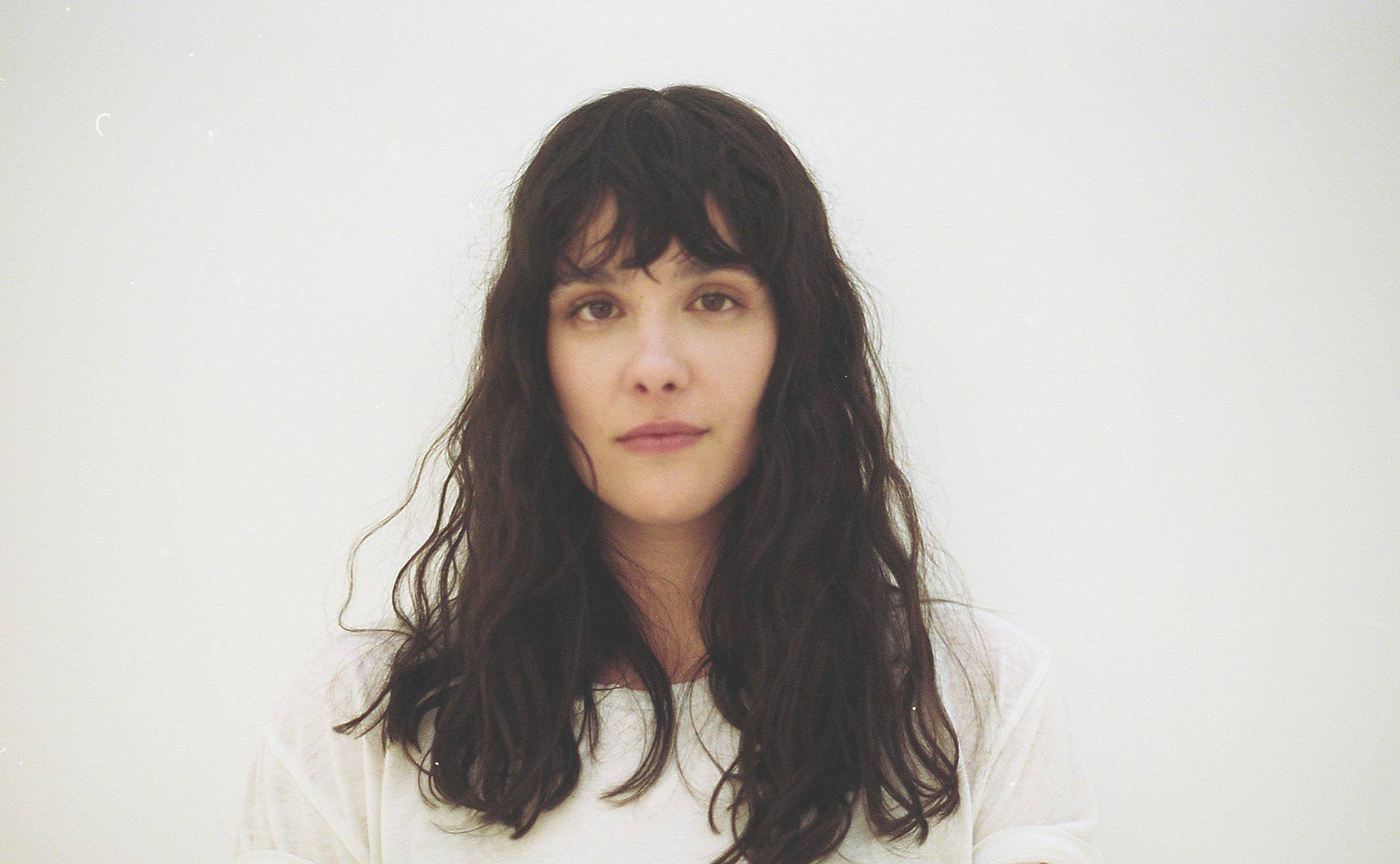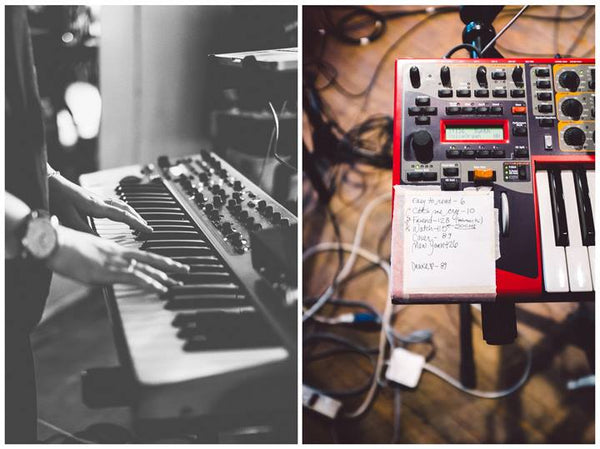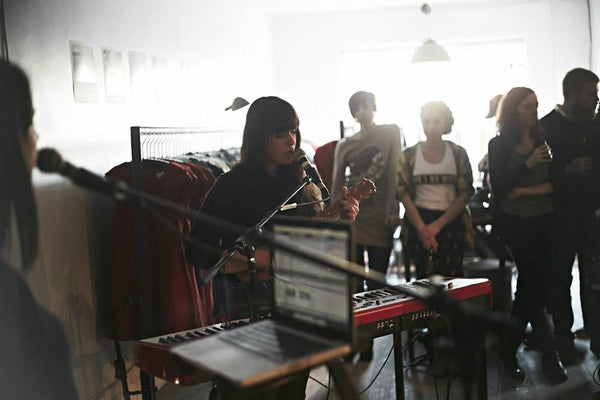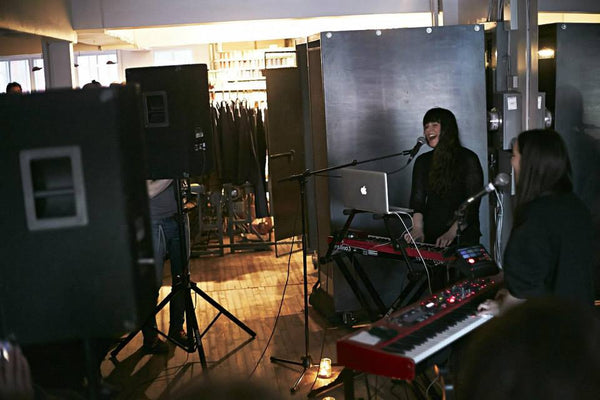
Laurence Lafond-Beaulne has been in the music business for over a decade. After studying music, which led her to work with artists such as Ariane Moffat and Fanny Bloom, to name but two, she founded the duo Milk & Bone with Camille Poliquin (AKA Kroy). It's 8 years ago this year that the duo made their first performance at a party at atelier b. All the pictures below were taken during this evening.
It was after all these years of touring and performing around the world that I met Laurence by phone (COVID-19 obliges) to talk about ACT. Act is a project that Laurence started with the help of two other women, Aurore Courtieux-Boineau and Caroline Voyer, which aims to help artists and promoters produce greener shows and reduce the overall carbon footprint of the entertainment industry. Several artists are part of the movement, including Charlotte Cardin, Ariane Moffatt, Klô Pelgag, Les Sœurs Boulay and Safia Nolin.
----

Can you tell me about the beginnings of the ACT Project?
I've been on the road for a few years now. I've been playing with bands since I was twenty years old, since 2010. It's in 2015-2016 that I started to be more aware of our practices because we started talking more about the environment in general. I remember one scene that really made an impression on me.
It was after a show, there's always that moment when you pick up your instruments afterwards, when everyone's gone. That's when I noticed the horror scene in front of me: there's no one left in the room, there's a lot of plastic glasses on the floor and then, all over the stage, there were a lot of plastic bottles that had been half started. A technician would sweep up the bottles and just pick them up and put them in the garbage. I told myself that that's basically what our industry is all about: most artists say we want to get involved and have best practices, but we don't do that on a daily basis or in our work.
What was your approach after this event?
I've never studied environment, I've always studied and made music so when I wanted to start ACT, after that story, I researched to find tools to guide me towards eco-responsible practices. Finally, I realized that there was nothing like it. So I saw two options: either I could continue to be angry and do nothing or I could invent that tool. That's when I started approaching people, two women, who are Aurore and Caroline. Caroline is an environmental expert, she has been working in this field for a long time and she specializes in events. When I approached her two weeks earlier, Aurore had also approached her with the same project in mind. It was as if all the stars had lined up to make this project happen. So we put the three of us together and we worked hard, we really put all our energy, our heart and soul into it. It's a project that started with just three women who, in their spare time and on a voluntary basis, try to make a difference in the community. We are still only the three of us working on it!
Did you follow a specific methodology to put together the guide?
It's wonderful to collaborate with Caroline, she works at the Conseil québécois des événements écoresponsables, so the research, the readings, the standards, the information that exists, they have access to it. Caroline knows the advances and is up to date on research and best practices. What was really good was that Aurore and I had a lot of experience on tour, and with Caroline, we would expose problems and then she would bring us solutions or avenues for reflection. It's really a three-way dialogue with our personal knowledge and then we always challenge each other to try to improve the guide.
People are busy, they don't want to do research, they don't want to bust their heads, when you make their life as simple as possible it puts all the chances on our side to have a positive impact and that's what we see. In the festivals, we have ACT-accredited boxes that, without the artists asking for it, offer an eco-responsible environment. There are no single-use water bottles, but rather water bottles that are collected at the end and we make compost. A lot of things are being done now because people have started asking for it!
What was the reception in the community at the beginning of the initiative?
When we talked about it, when we approached people, everyone was like: "ah, I was just thinking that this was missing!" It's as if many of us realized the same thing at the same time, that there was a clear lack and that we weren't up to date in our practices. I felt that there were a lot of people who had the same fear as I did, but who didn't know where to start because there were a lot of things to change. When we talk about changing our behaviours, often we don't even know what the really good behaviours are. Sometimes people get stuck because they are afraid of doing the wrong thing!
Have you seen similar initiatives outside Quebec?
Yes, when we started ACT there wasn't really any, but now we're starting to see more and more of it taking shape. It's great because at the end of the day, what we want is for things to change on a bigger scale. In the last year, more and more initiatives are taking shape. There are people in other jurisdictions who tell us they want to do the same thing but in their own way and who are asking us for help. Clearly, there is a widespread awareness, and not just in Quebec, but also in Europe, in France. In the UK, there is Julie's Bicycle which is kind of the same concept and is super forward-thinking in there. So yes, there are more and more people who are putting tools for artists in their workplaces.
Are there any critics of your project?
It's not that easy for everyone. In general, the answers are super positive, but there are still people who are more reticent because they are comfortable, they don't want to be rushed in their ways, they are used to doing things this way. We decided to offer ACT with encouragement and allowing everyone to go at their own pace. I think that when you arrive suddenly with changes, you can lose more people along the way than if you go quietly with them and encourage them.
What we offer is a guide with concrete actions and what we often tell people is don't try to do everything at once, don't try to change everything at once because the shock can be a bit intense. But if you go with certain actions to start with, once the new habit is integrated into your daily life you don't change it, it's integrated, it's made "the new normal". In general by functioning like that, people are proud of having managed to change their practices and they realize that it's not more effort, that it's just changing reflexes.
Is it more expensive to produce a tour following the ACT guide versus a "standard" tour?
I think if you're more careful about certain things you can even save some money. For example, by investing in rechargeable batteries you stop spending money on your belt packs.
The biggest impact of the tour is to think about how to do long distances and think about the logistics of transport to avoid going backwards to minimize mileage. There are also actions such as trying to fly less often, prioritizing car and train. You certainly save money, but it takes a little longer, though. I would say that it really depends on the case, but in general we end up saving a little by rethinking the way we operate.
With Covid, how do you see the future of shows? How do you see the current situation?
For the environmentalist and activist in me, the idea of the drive-in shows really breaks my heart. Encouraging people in floats to come and watch float shows is something we try to avoid. Instead, we want to encourage people to use active transportation or public transit in general, so it's certainly not something that appeals to me and that worries me a bit. But, at the same time, I understand the need to try to be creative and the need to consume the music and to get together so I can't judge either because we're doing with what we have right now!
For the future of the show, I have so no idea. I'm one of those people who can't imagine a world without gatherings. I'm convinced that we'll have to get organized, but eventually we'll have no choice but to start again with certain measures.
I think that the more we move forward, the more we will succeed, as a community, in protecting each other and working together. I don't see a future that would only be digital, with exclusively digital shows. That's not what I'm interested in a show! What interests me is the connection I have with all the people around me. When I do a show, I like to be able to look into people's eyes and experience something with them, and I'm not able to do that from a distance and I'm not interested in that either. At the moment, I would tell you that I'm on hold, but I still have a certain confidence that it will come back eventually.
How do you see the future for ACT?
We want to get stronger. We are looking for financial partnerships because that is what we are missing. We have a lot of ideas, but it all takes money, and we are three women who work full time and are involved in a number of areas individually.
If we could hire people to help us, we could really expand the project much further. For us, it's the perfect time to rethink everything! We went through the entire guide and made changes because there are things that, two years ago, really represented an effort and that today go without saying. We're getting up to date with practices!
We have a great desire to export outside Quebec, to the rest of Canada, but perhaps also to Europe, and that will take funding, time and more help than we have at the moment. At the moment, we're starting to work a lot with labels as well, it seems logical to us to work at the source as it's often these teams who organise tours. There's a great desire for improvement on their part, so that's what we're working on a lot. We even want to make video clips to educate people. We have a lot of projects and we're working on all that. Even though we're in a pandemic and everything is on hold, we're still moving forward.
The art world is a male world, is the way you approach everything a female world?
Yes, Caroline is also part of the Women in the Environment network, and there are studies that show that it is mostly women who are involved in this cause. But I think there is room for everyone in the environmental field and it would be important that it's not just women who carry out these heavy tasks.
And in the arts community specifically?
There's no doubt that when you go to record labels, the environmental committees that are set up are mostly made up of girls. Yes, there are clearly more women than men who seem to carry these issues in their spheres of work. The people who were the most reticent were often more men.

Artistically, there's fun things coming your way?
Yes, at the moment I'm working on a solo project that wasn't really planned, but I think the confinement gave me time at last and I needed to create. It channeled something that was inside me and then needed to come out. It's a project where I really want to assert myself as a creative woman in the broadest sense of the word, so I'm going to do it all by myself. I want to prove to myself that I'm capable of doing everything on my own and show other women that you're capable of more than you think. It's really a project that will allow me to present what I'm capable of doing, to myself and to people, but above all to free myself from that little voice that says I'm not enough. I really want to get rid of this feeling of impostor. I know there are a lot of women who have it, so I'm trying to explore that and to surpass myself and be a positive role model, so that's going to be my project, we'll see what happens, but for now I'm really proud of what comes out of it.
Doing it all by yourself, what do you mean?
Everything! I write, I record myself, I'm going to mix too, so everything musical. I've never mixed anything myself, but I'm really going to put the effort and the time and I'm going to produce everything myself, everything, everything!
------

Avenues for reflection
Doing this interview with Laurence led me to question myself about my practices in everyday life. I think we're all asking ourselves the same questions right now about how we can have a greater impact on the environment. It's a difficult reflection at times and I believe that one can gain a lot from reading the ACT guide, even if one is not in the entertainment business. The guide contains many gestures that we can apply in our daily lives to make them our new habits without disrupting our lives too much. One habit at a time can make big waves.
The photos taken at atelier b by Bruno Guérin.

